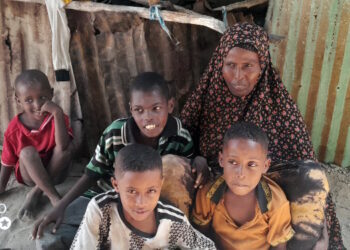(ERGO) – The buying and selling of land in the southern Somali city of Baidoa has slowed down due to the opening up of areas in Bay and Bakool regions that used to be under blockade by Al-Shabab.
Many families, who had settled in Baidoa due to the siege on other towns, have started returning to their original areas, including Hudur, Wajid, Dinsor, and Qansahdere, after the roads reopened.
The business of real estate and investment seems to have followed in the same direction, leaving those in Baidoa, who used to earn a living from commission from land sales, hard up.
Ilyas Ali Hassan, 54, says the last plot he sold in Baidoa as a broker was in August.
“When the town was busy, land was constantly bought and sold. We earned well from brokerage and managed our children’s needs. All of that stopped when our work ended about three months ago. The whole town has become a place where you cannot get anything,” he complained.
He has worked in land brokerage since 2019, often selling two plots a month, earning a commission fee of $150 to $200 each time.
Now he can barely provide regular meals for his family.
“Our life is very broken. It used to be a great benefit when a relative came, I would support them; anyone among my relatives who needed something I would give it. Now I am the one receiving help,” he said.
Six of his children have dropped out of school because he can no longer afford the $50 monthly fees. He has a $250 debt to food stores who want reimbursement. He is also under threat of eviction for failing to pay the $40 rent on his two-room iron-sheet house.
Ilyas and his family were displaced in 2017 from Goof-Gadud-Burey after the severe drought of that time destroyed their two-hectare farm, wiping out their main source of livelihood.
For Mohamed Madobe Ali, another who relied on land sales, without income since June he has had to reduce food for his family of 12. He used to count on about $200 a month from land sales. Increasingly they have to ask for assistance from neighbours.
“My worry now is about the essentials of family life, school and what is required. My children used to go to school, but now I am unemployed and have nothing,” he said, “The burden is very heavy.”
He has a debt of $150 at a local shop, which the owner is demanding back.
“It is a burden on me, a very heavy burden, because whoever you bought goods from wants their money back. I have been without income for two months,” he explained.
Mohamed found work as a land broker was profitable for the three years he was involved, and hadn’t foreseen this downturn. He can’t find other jobs in town. Six of his children have had to leave school because he can’t pay the $60 fees.
Mohamed’s family were displaced to Baidoa from Burhakaba in 2023, after losing their herd of goats. He says he fears they may soon return to displacement camps if he can’t find alternative income.
The chairman of the brokers’ committee in Baidoa, Mohamed Guhaad Ali, said this year has seen a big change for around 200 families living off land sales commissions.
“The families who used to trade land are facing hardships. There are many problems, including the slowdown in land transactions and a sharp decline in their livelihoods,” he said.
As a committee, they lack the capacity to offer assistance. Many of these families had managed to rebuild their lives after years of displacement, but are at risk of returning to the camps again.











